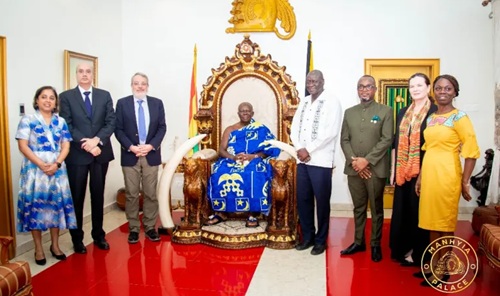
VIDEO: I don't want to depend on politicians for development – Asantehene
The Asantehene, Otumfuo Osei Tutu II, has called for greater collaboration between the World Bank and the Manhyia Palace to expedite the implementation of critical development projects aimed at transforming the region’s economic and social landscape.
Speaking at a meeting with World Bank officials on Friday, January 10, 2025, at the Manhyia Palace, the Asantehene expressed frustration over delays in key projects, including the Kumasi Rapid Transport Project and interventions to address Ghana’s energy costs.
“Kumasi is the commercial hub of Ghana, but the increasing population and congestion are costing the economy dearly. The 28-kilometre rapid transport line from Ejisu to Abuakwa can ease this burden by facilitating the movement of goods and passengers and creating much-needed employment,” he said.
The Asantehene criticised the bureaucracy that has stalled the Kumasi Rapid Transport Project for nearly a decade since its inception under the Japan International Cooperation Agency (JICA) and subsequent involvement by the World Bank. He called for decentralised project management to ensure efficiency.
“We cannot continue running projects for Kumasi from Accra. This is slowing progress. Let’s own the project and implement it quickly. It has been nearly 10 years of discussions, and if this project had been implemented earlier, the benefits in terms of employment and economic growth would have been immense,” he stated.
The Asantehene stressed the importance of a community-driven approach to development. “I cannot depend on the politicians for development, I don’t want to depend on politicians for development. So, let’s have a social contract and then we do it,” he emphasised.
Energy challenges and funding cuts
Reflecting on Ghana’s energy challenges, the Asantehene highlighted the growing cost of excess energy payments, which he described as a burden on the nation.
“In 2019, we discussed Ghana’s energy issues, where the country was paying $500–$600 million annually for unused energy. Now I am told it is about $1.5 billion, and I believe it is time we revisit this issue to explore solutions such as exporting excess energy to Burkina Faso, Ivory Coast, and Mali,” he said.
He also pointed to past funding cuts that impacted crucial programmes. “In 2019, $180 million allocated to school feeding was withdrawn, as was the $500 million for budgetary support, partly due to energy issues. I hope we can revisit these matters to ensure Ghana benefits from these interventions,” he added.
World Bank pledges commitment
The World Bank’s Vice President for Western and Central Africa, Ousmane Diagana, led the delegation, which included Country Director Robert Taliercio and senior specialists in urban development, energy, and transport.
Mr Diagana expressed gratitude to the Asantehene for his guidance and pledged the World Bank’s continued support for Ghana’s development initiatives.
The meeting, attended by officials from the Ashanti Regional Coordinating Council, underscored the critical need for collaborative solutions to advance development projects in Kumasi and beyond.
Watch the video below;
"I cannot depend on the politicians for my development. I don't want to depend on them, so let's have a social contract and then we do it." — Asantehene to the World Bank Vice President for Western and Central Africa#GraphicOnline #DailyGraphic pic.twitter.com/CyR0V8a1uE
— DailyGraphic GraphicOnline (@Graphicgh) January 11, 2025
